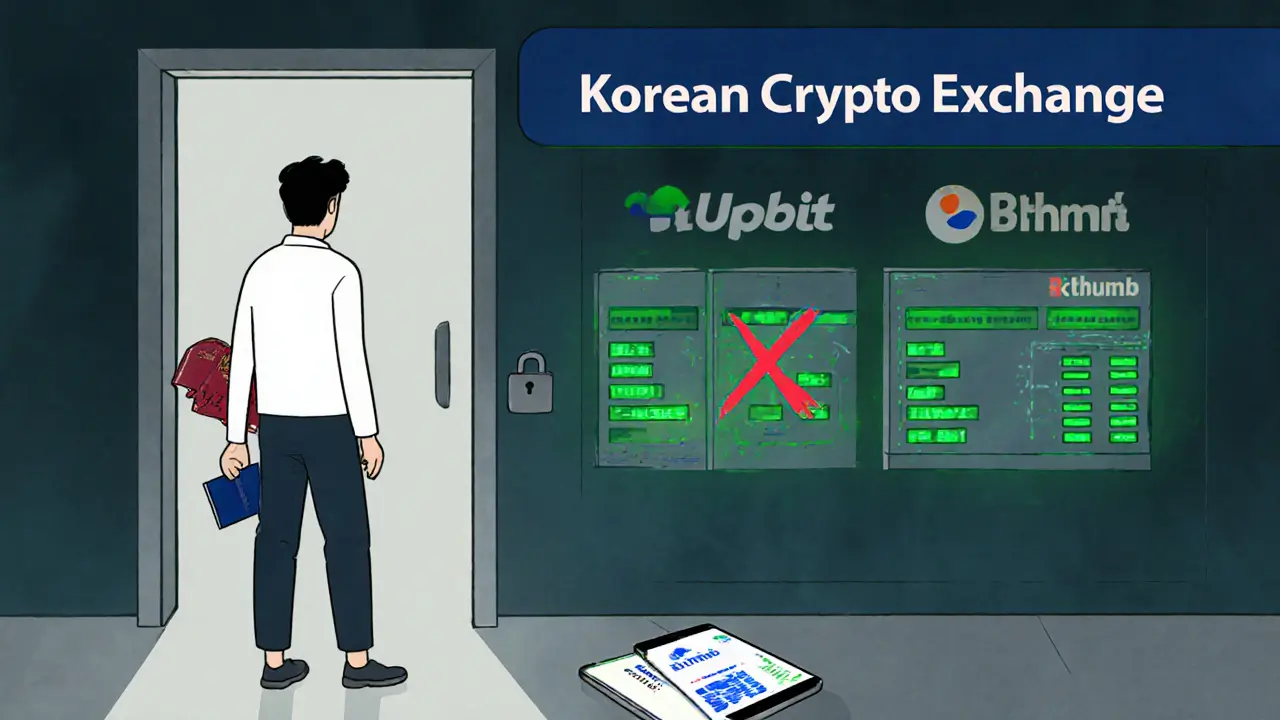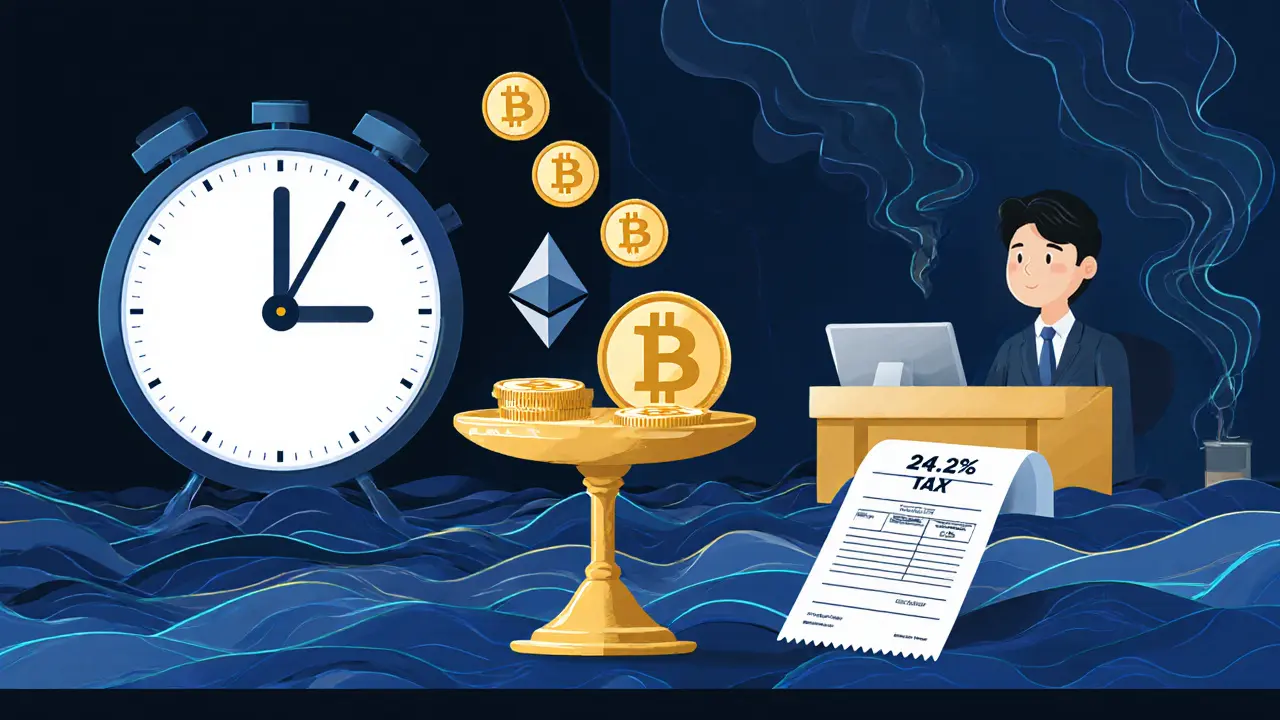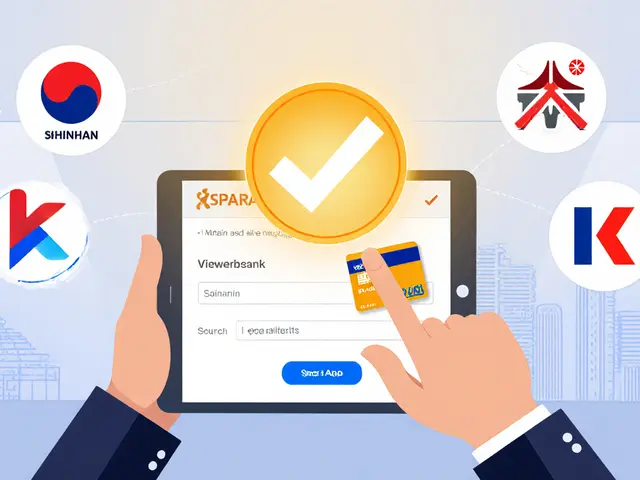Korean Crypto Exchange Compatibility Checker
How It Works
Select your bank to see which Korean exchanges you can use for crypto trading. Korea requires real-name bank accounts linked to your identity for all transactions.
This tool shows only exchanges that accept your bank based on official partnerships.
Select your bank to see compatible exchanges
South Korea doesn’t let you trade crypto unless your bank account matches your ID. No exceptions. No anonymous wallets. No offshore accounts. If you want to buy Bitcoin, Ethereum, or any other coin on a Korean exchange, you must link it to a real-name bank account under your legal name. This isn’t a suggestion. It’s the law.
Why Does Korea Have This Rule?
In 2017, South Korea’s crypto market exploded. Everyday people - students, office workers, grandparents - were buying Bitcoin like it was groceries. But with no oversight, scams, money laundering, and fake accounts ran wild. The government panicked. Justice Minister Park Sang-ki even threatened to ban crypto entirely.
Then 220,000 citizens signed a petition. They didn’t want a ban. They wanted rules. So in January 2018, the Financial Services Commission stepped in. They didn’t shut down crypto. They made it traceable. Every trade had to tie back to a real person with a real bank account. The goal? Stop criminals. Build trust. Keep the market from collapsing under its own weight.
It worked. Today, South Korea has over 12 million crypto users - one of the highest adoption rates in the world. But access isn’t open to everyone.
How the Real-Name System Actually Works
You can’t just open a Bithumb or Upbit account and start trading. First, you need a bank account in your name at one of the approved banks: Shinhan, Kookmin, K-Bank, Kakao Bank, or Woori Bank. Then, you link that exact account to your exchange profile. No mismatches. No aliases. No transfers from someone else’s account.
Here’s the catch: you can only deposit or withdraw Korean Won (KRW) between your bank and the exchange if they’re partnered. Korbit works only with Shinhan. Upbit only with K-Bank. Bithumb only with Kookmin. Coinone only with Kakao. If your bank isn’t linked to your exchange, you’re locked out.
When you deposit KRW, the exchange checks your name, ID number, and bank account against the bank’s records. If anything doesn’t match - even a typo in your surname - the transfer gets blocked. Same for withdrawals. You can’t send crypto to an external wallet unless you’ve already verified your identity through your bank.
Banks monitor transactions. If an exchange fails to send user data, the bank freezes all activity. No warning. No second chance. It’s automated, fast, and unforgiving.
Who Can Use It? (It’s Not for Everyone)
South Korean citizens? Easy. You have an ID card, a local bank account, and a Korean phone number. You sign up, verify your identity, link your bank, and you’re in.
Foreigners? Forget it - unless you’re a resident.
To open a real-name bank account as a foreigner, you need:
- A permanent residency visa or long-term work/study visa (minimum 1 year)
- An Alien Registration Card (ARC)
- A Korean mobile number
- A Korean address
No ARC? No bank account. No bank account? No crypto trading on Korean exchanges. It’s that simple. Tourists, digital nomads, expats on short-term visas - you can’t trade on Upbit or Bithumb. Even if you send money from your U.S. or German bank, Korean exchanges won’t accept it. They’re legally required to reject any transaction that doesn’t pass the real-name check.
International exchanges like Binance or Coinbase don’t support KRW deposits. You can’t use your Visa or Mastercard to buy crypto with Korean won unless you’re on a Korean exchange - and you can’t get on a Korean exchange without a real-name account.

What About Taxes?
South Korea isn’t just watching your trades. They’re taxing them.
Starting in 2027, anyone in Korea who makes money from crypto trading - whether it’s Bitcoin, altcoins, or NFTs - will pay income tax on those gains. The rate? Up to 24.2%. That’s higher than the capital gains tax in the U.S. or Germany.
And it’s not just individuals. Foreign companies earning income from crypto trades in Korea will now be treated as having domestic-source income. That means they’ll owe Korean corporate taxes too.
This isn’t a future threat. The law is already passed. The government is preparing systems to track every trade. If you’re trading on a Korean exchange, they’re already reporting your activity to the tax office. You’ll get a notice in 2027. Don’t assume you’ll be missed.
Which Exchanges Are Approved?
Only five exchanges have full approval to use real-name bank accounts as of April 2025:
- Korbit - partnered with Shinhan Bank
- Upbit - partnered with K-Bank
- Bithumb - partnered with Kookmin Bank
- Coinone - partnered with Kakao Bank
- Gopax - partnered with Woori Bank
There are 28 other Virtual Asset Service Providers (VASPs) registered with the Financial Intelligence Unit, but they can’t move money through real-name bank accounts. That means they can’t offer KRW deposits or withdrawals. They’re stuck with crypto-to-crypto trading only - which most retail users don’t need.
If you’re a Korean user, stick to these five. Anything else is either illegal or risky. The government shuts down unapproved platforms fast.

What Are the Downsides?
Security? Yes. Transparency? Absolutely. But the system has real costs.
First, it kills innovation. New exchanges can’t enter the market without bank partnerships - and banks are extremely selective. That means less competition, fewer features, and higher fees.
Second, it pushes users offshore. Some Koreans use VPNs and foreign exchanges to trade anonymously. But that’s against the law. If caught, you could face fines or even criminal charges.
Third, it’s a barrier for global adoption. South Korea has one of the most active crypto markets - but it’s almost entirely domestic. Foreign investors can’t participate easily. That limits liquidity and keeps institutional money away.
And language? Most support is in Korean. If you don’t speak it, you’re on your own. No English chatbots. No global help desks. Just a phone number you can’t call from abroad.
Is This Model Spreading?
Yes. Countries like Japan, Singapore, and even the EU are watching South Korea closely. Some are considering similar real-name rules for crypto exchanges.
But most don’t go this far. The U.S. doesn’t require bank account linking. The U.K. doesn’t tie crypto to ID cards. Even China’s crackdown didn’t include real-name bank integration - just outright bans.
South Korea’s system is unique because it forces banks to act as gatekeepers. That’s powerful. But it’s also fragile. If one bank pulls out, the whole system risks disruption.
For now, it’s working. The market is growing - projected to hit $635 million by 2030. But the cost? Exclusion. Is a safe market worth shutting out the rest of the world? That’s the question Korea’s still wrestling with.
What Should You Do?
If you’re a Korean citizen: register with one of the five approved exchanges. Link your bank. Understand the tax rules coming in 2027. Keep records. Don’t assume the exchange will do it for you.
If you’re a foreigner: don’t waste time trying to hack the system. No VPN. No borrowed ID. No fake residency. You won’t get in. And if you do, you’re breaking the law. Your funds could be frozen. Your account could be reported. The risk isn’t worth it.
Instead, use international exchanges. Trade in USD, EUR, or GBP. Accept that Korea’s crypto market is closed to outsiders. It’s not a glitch. It’s policy.
The real-name system isn’t going away. It’s getting stronger. Tax enforcement is coming. Banks are tightening controls. The only thing that’s changing is how much it costs to play - and who gets to play at all.

Sarah Scheerlinck
This is totalitarian control disguised as financial regulation. The government is tracking every digital penny you make, and they call it ‘transparency.’ Next they’ll require you to file a daily log of what you ate for breakfast so they can tax your avocado toast.
Evan Koehne
So Korea’s solution to crypto chaos is to turn every citizen into a bank’s little data slave? Brilliant. We’ll just trade Bitcoin like we’re filling out a tax form in 1953. At this point, I’m just waiting for the mandatory crypto yoga sessions to comply with ‘mindful trading.’
Robert Bailey
Honestly I get it. When everyone’s gambling with life savings, you gotta put some guardrails on. I’d rather have a system that works than one that’s wide open and full of scams. It’s not perfect but it’s way better than the wild west we had in 2017.
Wendy Pickard
As someone who’s tried to use Korean exchanges while living abroad, this is painfully accurate. I had my funds frozen because my Korean phone number expired. No warning. No appeal. Just gone. It’s not just about identity - it’s about access being tied to bureaucracy you can’t control.
Angie McRoberts
It’s funny how people scream about censorship when it’s their own money being regulated. If you’re trading crypto in Korea, you’re playing by Korea’s rules. If you don’t like it, trade elsewhere. No one’s forcing you to use Upbit.
Vipul dhingra
Why do you think they need all this when Binance works fine everywhere else The real problem is Korean banks are too lazy to innovate so they just lock everything down and call it security
Jeana Albert
And yet they still let people buy 1000 bottles of soju with cash but can’t let someone buy 0.1 BTC without a 3-week ID verification? This isn’t regulation, it’s cultural paranoia wrapped in legal jargon. They’re terrified of people making money outside their system.
Natalie Nanee
2027 tax is coming and you think you’ll be fine because you ‘don’t make much’? Wake up. The government already has your transaction history. They’re not asking - they’re auditing. And if you’re using a VPN to trade on Binance? Congratulations, you just signed up for a 10-year legal nightmare.
Jacque Hustead
I’m an American who lived in Seoul for two years. I tried to get a real-name account. No ARC, no chance. I watched Korean friends cry because their cousin’s transfer got rejected over a typo in the surname. This system protects the system - not the people. But I also get why it exists. It’s tragic, but not irrational.
Diana Smarandache
The fact that you’re even discussing this as if it’s a ‘choice’ reveals your ignorance. This isn’t about freedom. It’s about sovereignty. Korea isn’t asking for permission. It’s enforcing its legal framework. If you can’t adapt, you don’t belong in their market. End of story.
karan thakur
Mark my words this is the first step toward a national crypto surveillance state where your spending habits determine your social credit score. The same people who banned gambling now want to monitor your altcoin portfolio. This isn’t finance - it’s control.
Chris Hollis
12 million users sounds impressive until you realize 98% of them are retail speculators. The institutional money isn’t here because the system is a cage. No liquidity depth. No derivatives. No flexibility. Just a glorified bank portal with extra steps. It’s a dead end disguised as a revolution.
Sarah Scheerlinck
And now the tax is coming. Of course it is. The moment a government lets you make money, they immediately start figuring out how to take it. Welcome to the future - where your crypto gains are taxed higher than your salary, and your bank account is your jailer.